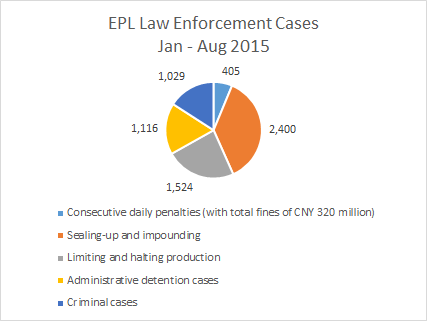A year after it came into effect Li Huini, Partner at Adamas, looks at the effect that China’s revised Environmental Protection Law (EPL) has had. She notes a number of concrete improvements, particularly with regard to enforcement, but says that it will not be possible to measure the full impact of the law for a few years to come.
 As the EPL’s one year anniversary has just passed on 1st January, it is worth reflecting on the various endeavours of all stakeholders to implement the law and, more importantly, whether these efforts are helping to provide better protection for China’s environment.
As the EPL’s one year anniversary has just passed on 1st January, it is worth reflecting on the various endeavours of all stakeholders to implement the law and, more importantly, whether these efforts are helping to provide better protection for China’s environment.
Law enforcement
Enforcement of China’s laws has always been a crucial challenge and every year the European Chamber’s Position Paper raises this as a major concern of its member companies. The revised EPL granted public authorities more effective enforcement measures, with the Ministry of Environmental Protection (MEP) immediately promulgating a number of implementation decrees as soon as the law came into effect. These included:
- Measures for the Implementation by Competent Environmental Protection Administrations of Consecutive Daily Penalties (effective as of 1st January, 2015, MEP decree 28);
- Measures for the Implementation of Sealing-up and Impounding by Competent Environmental Protection Administrations (effective as of 1st January, 2015, MEP decree 29); and
- Measures for the Implementation by Competent Environmental Protection Administrations of Limiting and Halting Production for Remediation (effective as of 1st January, 2015, MEP decree 30).
Very shortly after, the Supreme People’s Court promulgated the Interpretation of the Supreme People’s Court on Several Issues Concerning the Application of Law in the Conduct of Environmental Civil Public Interest Litigations, which became effective as of 7th January, 2015.
It is certainly quite rare to have this intensity of legislative, jurisdictive and executive engagement in China, and these extremely detailed decrees provide genuine executable rules for the enforcement of the EPL.
Public announcements made by the MEP with regard to EPL enforcement achievements up until the end of August 2015, can be seen in the chart below:
Public participation
The public’s right to be informed was an important concern that contributed a great deal towards the need to revise the EPL. After the law’s release, the MEP promulgated:
- Measures for the Disclosure of Environmental Information by Enterprises and Public Institutions (effective as of 1st January, 2015, MEP decree 31); and
- Measures for Public Participation in Environmental Protection (effective as of 1st September, 2015, MEP decree 35).
These measures are intended to ensure public participation in environmental protection.
In addition to the requirement for public institutions and enterprises to make their pollution-related information publicly available, the MEP also started to publish complaints, actions and results of cases reported through the national environmental protection hotline, reachable by calling 12369. Social media platforms, such as Weibo and Wechat, have also become well utilised as communication tools related to environmental protection. The accessible nature of this kind of participation in environmental protection matters has managed to stimulate public enthusiasm and has led to more, and more effective, interaction between the public and relevant administrations. In some provinces cases involving public requests for information disclosure were initiated, and in Jiangsu and Zhejiang provinces, Non-governmental Organisations have become more deeply involved in the decision making processes of enforcement authorities.
 Strengthening local governments’ responsibilities
Strengthening local governments’ responsibilities
The EPL imposes extensive responsibilities upon China’s public authorities, especially at all levels of local government. Upon the promulgation of the revised EPL, a number of local governments promulgated their own local regulations to ensure proper implementation of the law and introduced detailed local rules specifying local government responsibilities.
For example, Hebei Province promulgated the Regulations of Hebei Province on Public Participation in Environmental Protection; Guangdong Province promulgated the Regulations of Guangdong Province on Environmental Protection; and the People’s Congress of Wuhan City of Hubei Province promulgated Regulations of Wuhan on Motor Vehicle Emission Pollution Control. These local regulations not only impose liabilities on enterprises but also increase the responsibilities at all levels of local government.
Influence on new legislation
As the basis for all other related laws and regulations, the EPL lays down the foundation and basic principles that are applicable across diverse fields of environmental protection.
On 29th August, 2015, the Law on the Prevention and Control of Atmospheric Pollution (LPCAP) was revised, eventually coming into effect on 1st January, 2016. The revised LPCAP expands its content from 66 to 129 provisions. Among other revisions, the LPCAP particularly follows the EPL with respect to:
- The coordinating mechanism for joint prevention and control of environmental pollution in major administrative regions, as set forth in the EPL. This mechanism is now integrated in the LPCAP as an independent chapter (chapter V) about the joint prevention of atmospheric pollution in major regions. Accordingly, the state has established a coordinating mechanism for the prevention and control of atmospheric pollution in major regions to plan and implement prevention and control work, and specify coordinated control targets in a consistent and unified way.
- Strict legal liabilities, especially consecutive daily penalties. The LPCAP goes a step further in adding other forms of fines and punishments. It also adds further concrete ways for sealing-up and/or impounding polluting equipment, and limiting and halting production in polluting facilities. In total, the LPCAP has established nearly 90 concrete forms of penalties.
- Transparency and public participation. It is specifically required in the LPCAP that public opinions shall be solicited and information shall be made publicly available with regard to: formulating all kinds of standards; communication between environmental protection administrations and local governments; lists of major polluting entities; environmental assessment documentation of new projects; key area atmospheric monitoring information and analytical results; contingency plans for heavy pollution; and major environmental emergency monitoring information.
Industrial structure optimisation
The new EPL plays an important role in the optimisation of industrial structures. After its promulgation environmental protection standards at national, local and industrial levels have continued to improve. The newly announced industrial standards are much stricter than before. Stricter liabilities and higher costs for illegality are forcing enterprises to increase their investments in environmental protection funds and facilities, and upgrade production equipment. Companies operating in industries that consume a lot of energy and are highly polluting, such as the ceramics, steel and textile industries, are now being forced to look for merger and reorganisation opportunities to improve their productivity and optimise their industrial structure.
In the meantime, due in part to the increase of the public’s environmental awareness through the new EPL, the demand for green products is increasing. Enterprises, machinery and technology specialised in natural resources development and protection, energy conservation and emissions reduction, resources recycling and environmental management services are entering a period of rapid development.
Over the past year, the EPL has undoubtedly brought significant improvements in terms of legislation and law enforcement in China. Its contribution to the improvement of social environmental consciousness and environmental protection is enormous as well. Despite the slowdown of the Chinese economy, which has seen the focus of local governments swing precariously between economic development and environmental protection, the legal constraints already established by the EPL have so far largely prevented local governments and enterprises from completely neglecting their environmental responsibilities. However, it will only be possible to observe over the long term just how the EPL will contribute to the healthy development of China’s economy and the daily life of its citizens.
Founded in 1969, ADAMAS advises major European companies, institutions, public entities and governmental authorities on business and public law matters and assists them in litigation. In Mainland China, ADAMAS is the oldest existing foreign law firm licensed by the PRC Ministry of Justice to practice in the field of law. ADAMAS now has representative offices in Beijing and Shanghai, and partner offices in Chengdu, Guangzhou and Wuhan. With its professional practical experience and expertise developed over four decades, ADAMAS has now become one of the leading European law firms in this dynamic and largest economic entity of Asia. Especially in the fields of environment, energy, construction and infrastructure ADAMAS has successfully integrated its European expertise into its China practice and shares the best know-how with its clients and partners.



Recent Comments